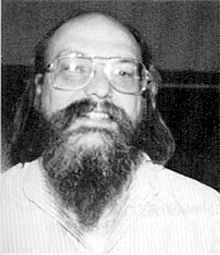„Keď máte pochyby, použite surovú silu.“
en: When in doubt, use brute force.
Potvrdené výroky
Zdroj: http://wiki.c2.com/?BruteForce
Kenneth Thompson je americký informatik významný svojou prácou na operačnom systéme Unix.
Thompson sa narodil v New Orleans, Louisiana v USA. Dosiahol bakalársky a inžiniersky titul, oba v oblasti elektrotechniky na University of California, Berkeley.
V roku 1969, počas jeho práce v Bell Labs, sa Thompson a Dennis Ritchie stali hlavnými tvorcami operačného systému Unix. Thompson tiež napísal programovací jazyk B, predchodcu jazyka C, v súčasnosti jedného z najbežnejšie používaných programovacích jazykov. Navyše, počas písania operačného systému Multics vytvoril programovací jazyk Bon. Tiež napísal pôvodný štandardný Unixový editor ed, ktorý bol odvodený od skoršieho editora QED.
O niečo neskôr, stále počas práce v Bell Labs, spolu s Robom Pikeom boli hlavnými tvorcami operačného systému Plan 9. Počas práce na ňom vytvoril znakové kódovanie UTF-8 pre použitie v Plan 9.
S J. H. Condonom sa Thompson podieľal na vývoji Belle, šachového počítača. Napísal programy pre vytvorenie absolútneho hodnotenia šachových postavení. V súčasnosti sú takto ohodnotené všetky pozície do 6 kameňov. Za ich použitia môže šachový počítač hrať úplne dokonale.
Thompson a Ritchie spolu dostali v roku 1983 Turingovu cenu "za ich vývoj všeobecnej teórie operačných systémov a konkrétne za implementáciu operačného systému UNIX". Thompsonov programátorský štýl ovplyvnil ostatných predovšetkým strohosťou výrazov a uprednostňovaním jasných výrazov.
Thompson odišiel z Bell Labs 1. decembra 2000 a v súčasnosti je spolupracovníkom v Entrisphere, Inc.
Wikipedia

„Keď máte pochyby, použite surovú silu.“
en: When in doubt, use brute force.
Potvrdené výroky
Zdroj: http://wiki.c2.com/?BruteForce
„Ak chcete niekam ísť, ísť tam je najlepší spôsob ako sa tam dostať.“
en: If you want to go somewhere, goto is the best way to get there
Potvrdené výroky
Zdroj: http://fortunes.cat-v.org/plan_9/
„Jedným z mojich naproduktívnejších dní bol, keď som zahodil 1000 riadkov kódu.“
en: One of my most productive days was throwing away 1000 lines of code.
Potvrdené výroky
Zdroj: http://citeseerx.ist.psu.edu/viewdoc/download?doi=10.1.1.110.5490&rep=rep1&type=pdf
[The UNIX programming environment, Kernighan, Brian W., Brian Kernighan, Pike, Rob, w:Rob Pike, Prentice-Hall, 1984, 10269821, 0139376992], p. 204 http://books.google.com/books?id=poFQAAAAMAAJ&q=%22spell+creat+with+an+e%22&dq=%22spell+creat+with+an+e%22.
“The press, television, and movies make heroes of vandals by calling them whiz kids.”
"Reflections on Trusting Trust" http://cm.bell-labs.com/who/ken/trust.html, 1983 Turing Award Lecture http://cm.bell-labs.com/who/ken/trust.html,Communications of the ACM 27 (8), August 1984, pp. 761-763.
Kontext: The press, television, and movies make heroes of vandals by calling them whiz kids.... There is obviously a cultural gap. The act of breaking into a computer system has to have the same social stigma as breaking into a neighbor's house. It should not matter that the neighbor's door is unlocked.
"Unix and Beyond: An Interview with Ken Thompson," 1999
Kontext: In Plan 9 and Inferno, the key ideas are the protocol for communicating between components and the simplification and extension of particular concepts. In Plan 9, the key abstraction is the file system—anything you can read and write and select by names in a hierarchy—and the protocol exports that abstraction to remote channels to enable distribution. Inferno works similarly, but it has a layer of language interaction above it through the Limbo language interface—which is like Java, but cleaner I think.
"Reflections on Trusting Trust" http://cm.bell-labs.com/who/ken/trust.html, 1983 Turing Award Lecture, Communications of the ACM 27 (8), August 1984, pp. 761-763.
Kontext: You can't trust code that you did not totally create yourself. (Especially code from companies that employ people like me.) No amount of source-level verification or scrutiny will protect you from using untrusted code.
"Unix and Beyond: An Interview with Ken Thompson," 1999
Kontext: Unix was a very small, understandable OS, so people could change it at their will. It would run itself—you could type "go" and in a few minutes it would recompile itself. You had total control over the whole system. So it was very beneficial to a lot of people, especially at universities, because it was very hard to teach computing from an IBM end-user point of view. Unix was small, and you could go through it line by line and understand exactly how it worked. That was the origin of the so-called Unix culture.
“The X server has to be the biggest program I've ever seen that doesn't do anything for you.”
Thompson later followed up: "I now realize that X was just miles ahead in its programming style." http://www.google.com/moderator/#15/e=7f3&t=7f3.44
Plan 9 fortune file (1992)
Ken Thompson, talking about the origins of the Go programming language
Dr. Dobb's: Interview with Ken Thompson, 18 May 2011, 7 February 2014 http://www.drdobbs.com/open-source/interview-with-ken-thompson/229502480,
"Interview with Ken Thompson", 2011
“It does everything Unix does only less reliably.”
In response to the question, "Can you sum up plan 9 in layman's terms?"
Plan 9 fortune file (1992)
“grep was a private command of mine for quite a while before i made it public.”
Zdroj: The history of grep, the 40 years old Unix command, Benjamin Rualthanzauva, 5 Feb 2014 https://medium.com/@rualthanzauva/grep-was-a-private-command-of-mine-for-quite-a-while-before-i-made-it-public-ken-thompson-a40e24a5ef48,
Ken Thompson; cited in
"Coders At Work", 2009
"Unix and Beyond: An Interview with Ken Thompson," 1999
"Unix and Beyond: An Interview with Ken Thompson," 1999
Ken Thompson; cited in [Seibel, Peter, Coders At Work, 2009, 475]
"Coders At Work", 2009
"Unix and Beyond: An Interview with Ken Thompson," 1999
I feel the same about Unix.
"Ken Thompson clarifies matters", 1999
"Unix and Beyond: An Interview with Ken Thompson," 1999
“I think the open software movement (and Linux in particular) is laudable.”
"Ken Thompson clarifies matters", 1999
Ken Thompson; cited in [Seibel, Peter, Coders At Work, 2009, 479]
"Coders At Work", 2009
Thompson on the superiority of <tt>ed</tt> to editors such as today's <tt>vi</tt> or <tt>emacs</tt>, as summarized by Peter Salus in A Quarter Century of UNIX (Addison-Wesley, 1994). http://web.archive.org/web/20080103071208/http://www.dcs.qmul.ac.uk/~george/history/
"Reflections on Trusting Trust" http://delivery.acm.org/10.1145/360000/358210/reflections.pdf, 1983 Turing Award Lecture, Communications of the ACM 27 (8), August 1984, pp. 761-763.
"Reflections on Trusting Trust" http://delivery.acm.org/10.1145/360000/358210/reflections.pdf, 1983 Turing Award Lecture, Communications of the ACM 27 (8), August 1984, pp. 761-763.